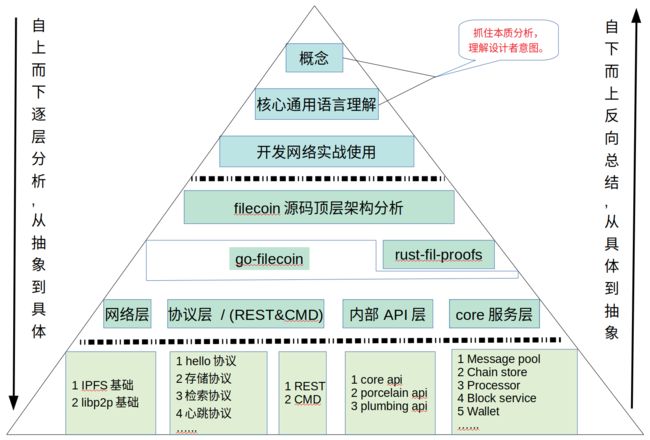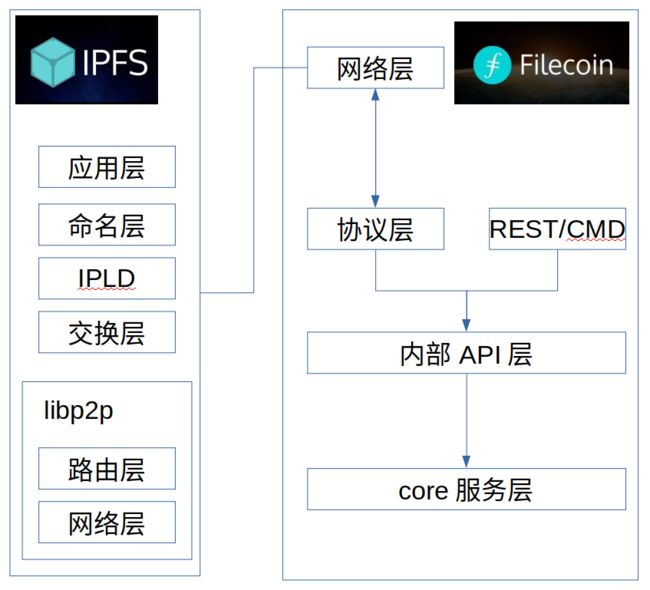本文作者:先河系统杨尉;原创作品,转载请注明出处
[上一篇链接] filecoin技术架构分析之三:3 filecoin开发网络使用
[下一篇链接] filecoin技术架构分析之五:5 filecoin源码协议层分析之心跳协议
目录
- 4 filecoin源码顶层架构分析
- 4.1 题外话——关于竞争力
- 4.2 filecoin顶层架构概览及分析思路
- 4.2.1 分析思路
- 4.2.2 filecoin顶层架构概览
- 4.3 网络层
- 4.4 协议层
- 4.5 REST/CMD
- 4.6 内部api层
- 4.7 core服务层
4 filecoin源码顶层架构分析
4.1 题外话——关于竞争力
网络技术的高速发展带领我们进入了知识大爆炸、技术快速跃迁的时代,5G已经开始走向商业落地,网络速率的再次跃迁给我们带来了无限的想象空间,全息投影、即时翻译、远程医疗、人工智能等等会更加成熟落地?路由器在个人家庭中的角色可能会发生变化?IOT万物互联的时代将会真正到来?区块链的TPS提升?高速网络下的云应用、大数据会出现什么新的玩法?
笔者想说的是,整个世界都在急速变化,在波涛汹涌的竞争浪潮之中,如何保持自己的竞争力。我偶尔会问同事、朋友,你与刚毕业的大学生相比,优势在哪里?
笔者认为如下两点才是在这个高速时代的真正竞争力,个人如此,公司团队亦如此。
- 高效的学习能力
- 高维的思维能力
以上为笔者观点,也欢迎大家探讨。在分析具体架构之前,笔者在4.2.1中分享了自己的分析思路,我认为这也许也值得分享。
4.2 filecoin源码顶层架构概览及分析思路
4.2.1 分析思路
终于进入到源码分析环节了,其实回顾一下前面三章,filecoin的概念及通用语言可以总结为filecoin的本质,分析源码的过程归根接底还是理解设计者的意图,第三章filecoin开发网络的实战使用对于笔者来说也是为了更清晰地对filecoin本质及设计意图进行深入理解。
-
分析总思路为:抓住本质分析,理解设计者意图
- 自上而下逐层分析,从抽象到具体
- 自下而上反向总结,从具体到抽象
-
分析过程分为三大步骤
- 第一步,理解filecoin本质及设计目的(前面三章)
- 第二步,理解filecoin的顶层架构设计(本章),反向加深对filecoin本质的理解
- 第三步,各层的具体源码分析(后面章节),反向加深对filecoin本质的理解
详细参见下图
- 在顶层源码中分为go-filecon和rust-fil-proofs。分别为主框架和存储证明部分,本文主要分析go-filecoin源码的顶层框架。
4.2.2 filecoin顶层架构概览
4.2.2.1 架构图
┌─────────────────────────────────────┐
│ │
Network │ network (gossipsub, bitswap, etc.) │ | | \/
│ │ |_| /\
└─────▲────────────▲────────────▲─────┘
│ │ │ ┌────────────────────────────┐
┌─────▼────┐ ┌─────▼─────┐ ┌────▼─────┐ │ │
│ │ │ │ │ │ │ Commands / REST API │
Protocols │ Storage │ │ Mining │ │Retrieval │ │ │
│ Protocol │ │ Protocol │ │ Protocol │ └────────────────────────────┘
│ │ │ │ │ │ │
└──────────┘ └───────────┘ └──────────┘ │
│ │ │ │
└──────────┬─┴─────────────┴───────────┐ │
▼ ▼ ▼
┌────────────────────────────────┐ ┌───────────────────┬─────────────────┐
Internal │ Core API │ │ Porcelain │ Plumbing │
API │ │ ├───────────────────┘ │
└────────────────────────────────┘ └─────────────────────────────────────┘
│ │
┌─────────┴────┬──────────────┬──────────────┬─┴────────────┐
▼ ▼ ▼ ▼ ▼
┌────────────┐ ┌────────────┐ ┌────────────┐ ┌────────────┐ ┌────────────┐
│ │ │ │ │ │ │ │ │ │
Core │ Message │ │ Chain │ │ Processor │ │ Block │ │ Wallet │
│ Pool │ │ Store │ │ │ │ Service │ │ │
│ │ │ │ │ │ │ │ │ │
└────────────┘ └────────────┘ └────────────┘ └────────────┘ └────────────┘
- 官方给出的如上架构概览图是小于实际源码的,但是不影响理解。
- 官方的spec项目中,有较多文档说明已经滞后于源码,其引用的源码有些已经从go-filecoin源码中消失了,想深入分析的朋友建议可以结合源码和文档同步进行看。
- 本文后面的章节中,只会简述各个层的设计目的,每一层的具体源码分析,将放到后面章节分享给大家。
4.2.2.2 IPFS与filecoin在技术架构层面的关系
- IPFS与filecoin同样采用IPLD结构,数据结构是互通的,简而言之,在IPFS之上存储的数据,filecoin可以读取。filecoin存储的未密封数据,IPFS也是可以读取的。
- IPFS与filecoin网络部分均复用libp2p部分。
- filecoin复用了大量IPFS组件,比如CID、IPLD、bitswap等等。
4.3 网络层
-
网络层的实现依赖协议实验室的libp2p项目,如果不熟悉的可以先简单记住如下要点,后面笔者考虑视情况补充IPFS/libp2p的相关分享。
libp2p的网络层实现了节点之间的联通性问题,包括节点发现、NAT穿透、pubsub、relay等。
libp2p的路由层的主要目的,包括节点路由、内容路由、DHT键值存储。
multistream需要理解,filecoin的协议层之协议定义就是基于mulitistream的。
-
filecoin网络层的目的
- 处理请求信息、回复响应信息,包括存储订单处理、检索请求处理、区块同步等等。
4.4 协议层
协议层主要处理应用级的逻辑,状态切换等,具体会通过api层调用具体的core服务进行处理。
4.4.1 hello握手协议
- 协议名称: /fil/hello/1.0.0
- 目的:
- 本节点上线,向其他节点发起hello握手请求,进而进行区块同步。
- 响应其他新上线的节点hello握手请求,触发其进行区块同步。
4.4.2 存储协议
4.4.2.1 存储矿工
- 协议名称:/fil/storage/mk/1.0.0、 /fil/storage/qry/1.0.0
- 目的:
- 接受客户发起的订单交易请求、查询订单请求,会提交对应处理状态到区块链上(包括清单处理成功或失败;密封成功或者失败等等)。
- 更新本地的密封或者订单状态。
4.4.2.2 存储客户
- 采用上述的/fil/storage/mk/1.0.0、 /fil/storage/qry/1.0.0协议,建立multistream,向矿工发起交易或者查询交易状态。
4.4.3 检索协议
4.4.3.1 检索矿工
协议名称:/fil/retrieval/free/0.0.0
-
目的:
接受客户的检索请求,并响应处理
注意:目前仅仅支持free检索,白皮书所描述的完整检索功能尚未实现。
4.4.3.2 检索客户
- 采用上述的/fil/retrieval/free/0.0.0协议,建立multistream,向矿工发起检索请求。
4.4.4 心跳协议
- 协议名称:fil/heartbeat/1.0.0
- 目的:
- 启动之后向指定节点发起心跳。
- 如前面3.2.1章节中的设置Nick Name,以及激活极点,都属于心跳协议实现的。
4.5 REST/CMD
- 这个应该不用多解释,提供cmd或者REST接口供用户操作具体节点。第三章中的开发网络使用基本都是使用的CMD方式。
4.6 内部api层
4.6.1 node对象
filecoin的node节点是一个上帝对象,从下面Node的结构可以看出,基本贯穿了filecoin的整个业务。
为了解决耦合性问题,尤其是后续轻节点的实现,官方已经开始将原有的api包,往plumbing包以及porcelain包迁移,这样做的目的是让系统具备更好的解耦性,以满足更灵活的需求。
plumbing和 porcelain模式也是借鉴git的思维。
▼+Node : struct
[fields]
+AddNewlyMinedBlock : newBlockFunc
+BlockSub : ps.Subscription
+Blockstore : bstore.Blockstore
+Bootstrapper : *filnet.Bootstrapper
+ChainReader : chain.ReadStore
+Consensus : consensus.Protocol
+Exchange : exchange.Interface
+HeaviestTipSetCh : chan interface{}
+HeaviestTipSetHandled : func()
+HelloSvc : *hello.Handler
+MessageSub : ps.Subscription
+MiningScheduler : mining.Scheduler
+MsgPool : *core.MessagePool
+OfflineMode : bool
+OnlineStore : *hamt.CborIpldStore
+PeerHost : host.Host
+Ping : *ping.PingService
+PorcelainAPI : *porcelain.API
+PowerTable : consensus.PowerTableView
+Repo : repo.Repo
+RetrievalClient : *retrieval.Client
+RetrievalMiner : *retrieval.Miner
+Router : routing.IpfsRouting
+StorageMiner : *storage.Miner
+StorageMinerClient : *storage.Client
+Syncer : chain.Syncer
+Wallet : *wallet.Wallet
-blockTime : time.Duration
-blockservice : bserv.BlockService
-cancelMining : context.CancelFunc
-cancelSubscriptionsCtx : context.CancelFunc
-cborStore : *hamt.CborIpldStore
-host : host.Host
-lookup : lookup.PeerLookupService
-mining
-miningCtx : context.Context
-miningDoneWg : *sync.WaitGroup
-sectorBuilder : sectorbuilder.SectorBuilder
[methods]
+BlockHeight() : *types.BlockHeight, error
+BlockService() : bserv.BlockService
+CborStore() : *hamt.CborIpldStore
+ChainReadStore() : chain.ReadStore
+CreateMiner(ctx context.Context, accountAddr address.Address, gasPrice types.AttoFIL, gasLimit types.GasUnits, pledge uint64, pid libp2ppeer.ID, collateral *types.AttoFIL) : *address.Address, error
+GetBlockTime() : time.Duration
+Host() : host.Host
+Lookup() : lookup.PeerLookupService
+MiningSignerAddress() : address.Address
+MiningTimes() : time.Duration, time.Duration
+NewAddress() : address.Address, error
+SectorBuilder() : sectorbuilder.SectorBuilder
+SetBlockTime(blockTime time.Duration)
+Start(ctx context.Context) : error
+StartMining(ctx context.Context) : error
+Stop(ctx context.Context)
+StopMining(ctx context.Context)
-addNewlyMinedBlock(ctx context.Context, b *types.Block)
-cancelSubscriptions()
-getLastUsedSectorID(ctx context.Context, minerAddr address.Address) : uint64, error
-getMinerActorPubKey() : []byte, error
-handleNewHeaviestTipSet(ctx context.Context, head types.TipSet)
-handleNewMiningOutput(miningOutCh chan mining.Output)
-handleSubscription(ctx context.Context, f pubSubProcessorFunc, fname string, s ps.Subscription, sname string)
-isMining() : bool
-miningAddress() : address.Address, error
-miningOwnerAddress(ctx context.Context, miningAddr address.Address) : address.Address, error
-saveMinerConfig(minerAddr address.Address, signerAddr address.Address) : error
-setIsMining(isMining bool)
-setupMining(ctx context.Context) : error
[functions]
+New(ctx context.Context, opts ...ConfigOpt) : *Node, error
4.6.2 api包
- 这基本上是早期实现的api接口,对应4.2.2.1中的Core API,严重依赖于Node,耦合性大。现在在逐步迁移。感兴趣可以参照如下源码逐层深入去看。
package: api
location: api/api.go
type API interface {
Actor() Actor
Address() Address
Client() Client
Daemon() Daemon
Dag() Dag
ID() ID
Log() Log
Miner() Miner
Mining() Mining
Paych() Paych
Ping() Ping
RetrievalClient() RetrievalClient
Swarm() Swarm
Version() Version
}
4.6.3 plumbing和porcelain包
- plumbing api简而言之,是实现底层的公共api,其不依赖于Node的实现。
- 而porcelain api则是在plumbing api之上,更偏应用级的调用,同样不依赖于Node实现。
源码分别参见go-filecoin目录下,./plumbing和./porcelain。
4.7 core服务层
关于核心业务调度以及业务持久化的底层处理基本都在这一层,包含但不限于如下服务。
4.7.1 Message pool
消息池主要保存还未上链的消息。
4.7.2 Chain store
链存储主要持久化链信息,注意同步区块的逻辑是在协议层的hello协议所出发的。
4.7.3 Processor
处理事务消息如何驱动状态转换。
4.7.4 Block service
负责IPLD数据的内容寻址,包括区块链等。
4.7.5 Wallet
钱包管理。
[上一篇链接] filecoin技术架构分析之三:3 filecoin开发网络使用
[下一篇链接] filecoin技术架构分析之五:5 filecoin源码协议层分析之心跳协议

